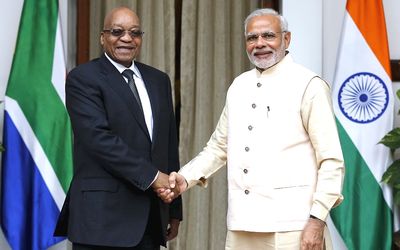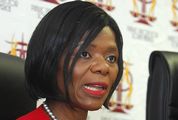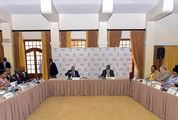India’s wooing of Africa tested by race attacks
by Amy Kazmin,
2016-02-15 05:52:45.0
NOT long ago, Indian Prime Minister Narendra Modi hosted more than 40 African leaders for a glitzy jamboree to reinvigorate New Delhi’s drifting relations with Africa.
Historically, the two continents had strong commercial and cultural links, forged by Indian Ocean traders. Now, India wants access to Africa’s vast energy reserves and its expanding middle-class markets. But it is struggling to counter China’s clout on the continent.
Admitting India had not been "as attentive" to Africa as it should, Mr Modi called for a new "partnership for prosperity". To strengthen frayed ties, he promised $10bn of concessional credit to Africa, and 50,000 scholarships for Africans to study in India, over the next five years.
But India’s courtship of Africa still faces formidable obstacles. Not least is the deep ambivalence of ordinary Indians towards Africans — especially the African students living in ever greater numbers in their midst.
That reality was highlighted two weeks ago by a vicious mob attack on four Tanzanians — including a 21-year-old female student — in Bangalore, India’s technology capital.
The assault followed a fatal car crash in which a 35-year-old Indian pedestrian was killed in an incident involving a Sudanese driver. A mob set his car ablaze.
When the uninvolved Tanzanians drove past half an hour later, the mob attacked and their car was set alight. The woman and her friends were badly beaten.
John Kijazi, Tanzania’s High Commissioner to India, called it a racist attack. "She was attacked because she was black, just like the person who was driving the vehicle that caused the accident," the diplomat told the Indian Express. "There is an element of mob justice to this, but there is also an element of racism."
For its part, New Delhi swung into damage-limitation mode. Foreign Minister Sushma Swaraj tweeted that she was "deeply pained over the shameful incident".
Indian diplomats escorted Mr Kijazi to Bangalore to press for action and greater security for African students. Eventually six Bangalore police officers were suspended and a few arrests were made.
But New Delhi is adamant the attack was not racist, rather an "isolated case" of mistaken identity.
Yet few Africans — and thoughtful Indians — are convinced this explanation is true. "In the eyes of the mob, one dark-skinned African is as good as another," wrote Indian novelist Sandip Roy.
Indian treatment of visiting Africans has ruffled relations between the continents before.
In 2013 Indian politicians in Goa publicly called Nigerians "wild animals" and "a cancer" after Nigerians protesting against a compatriot’s death clashed with local police.
Goan villagers imposed a social boycott, refusing to rent them rooms or motorcycles, prompting official Nigerian warnings of repercussions for "1-million Indians" living in their country.
In 2014 African diplomats protested after a Delhi politician led a midnight mob raid on an apartment of Ugandan women, who locals suspected of running a drugs and prostitution racket. Women were forced to submit to urine tests, but no evidence of criminal activity was found.
Indians are colour-conscious among themselves, fuelling a big business in "fairness creams". But discomfort with Africans runs deeper, rooted in colonial-era stereotypes of African society as barbaric.
China wrestled with this in the late 1980s, when there were clashes between Chinese and African students. But India can ill-afford such a conflagration in today’s connected world.
© Financial Times Limited 2016

President Jacob Zuma shakes hands with Indian Prime Minister Narendra Modi ahead of their meeting at Hyderabad House in New Delhi, India, last year. Picture: REUTERS/ADNAN ABIDI
NOT long ago, Indian Prime Minister Narendra Modi hosted more than 40 African leaders for a glitzy jamboree to reinvigorate New Delhi’s drifting relations with Africa.
Historically, the two continents had strong commercial and cultural links, forged by Indian Ocean traders. Now, India wants access to Africa’s vast energy reserves and its expanding middle-class markets. But it is struggling to counter China’s clout on the continent.
Admitting India had not been "as attentive" to Africa as it should, Mr Modi called for a new "partnership for prosperity". To strengthen frayed ties, he promised $10bn of concessional credit to Africa, and 50,000 scholarships for Africans to study in India, over the next five years.
But India’s courtship of Africa still faces formidable obstacles. Not least is the deep ambivalence of ordinary Indians towards Africans — especially the African students living in ever greater numbers in their midst.
That reality was highlighted two weeks ago by a vicious mob attack on four Tanzanians — including a 21-year-old female student — in Bangalore, India’s technology capital.
The assault followed a fatal car crash in which a 35-year-old Indian pedestrian was killed in an incident involving a Sudanese driver. A mob set his car ablaze.
When the uninvolved Tanzanians drove past half an hour later, the mob attacked and their car was set alight. The woman and her friends were badly beaten.
John Kijazi, Tanzania’s High Commissioner to India, called it a racist attack. "She was attacked because she was black, just like the person who was driving the vehicle that caused the accident," the diplomat told the Indian Express. "There is an element of mob justice to this, but there is also an element of racism."
For its part, New Delhi swung into damage-limitation mode. Foreign Minister Sushma Swaraj tweeted that she was "deeply pained over the shameful incident".
Indian diplomats escorted Mr Kijazi to Bangalore to press for action and greater security for African students. Eventually six Bangalore police officers were suspended and a few arrests were made.
But New Delhi is adamant the attack was not racist, rather an "isolated case" of mistaken identity.
Yet few Africans — and thoughtful Indians — are convinced this explanation is true. "In the eyes of the mob, one dark-skinned African is as good as another," wrote Indian novelist Sandip Roy.
Indian treatment of visiting Africans has ruffled relations between the continents before.
In 2013 Indian politicians in Goa publicly called Nigerians "wild animals" and "a cancer" after Nigerians protesting against a compatriot’s death clashed with local police.
Goan villagers imposed a social boycott, refusing to rent them rooms or motorcycles, prompting official Nigerian warnings of repercussions for "1-million Indians" living in their country.
In 2014 African diplomats protested after a Delhi politician led a midnight mob raid on an apartment of Ugandan women, who locals suspected of running a drugs and prostitution racket. Women were forced to submit to urine tests, but no evidence of criminal activity was found.
Indians are colour-conscious among themselves, fuelling a big business in "fairness creams". But discomfort with Africans runs deeper, rooted in colonial-era stereotypes of African society as barbaric.
China wrestled with this in the late 1980s, when there were clashes between Chinese and African students. But India can ill-afford such a conflagration in today’s connected world.
© Financial Times Limited 2016





















Change: -1.84%
Change: -2.22%
Change: -3.22%
Change: -2.18%
Change: -0.22%
Data supplied by Profile Data
Change: -0.36%
Change: -0.13%
Change: -1.84%
Change: 0.00%
Change: 0.00%
Data supplied by Profile Data
Change: -0.11%
Change: 0.08%
Change: 0.13%
Change: 0.44%
Change: -0.11%
Data supplied by Profile Data
Change: -0.02%
Change: -0.11%
Change: -0.39%
Change: -0.80%
Change: -2.32%
Data supplied by Profile Data